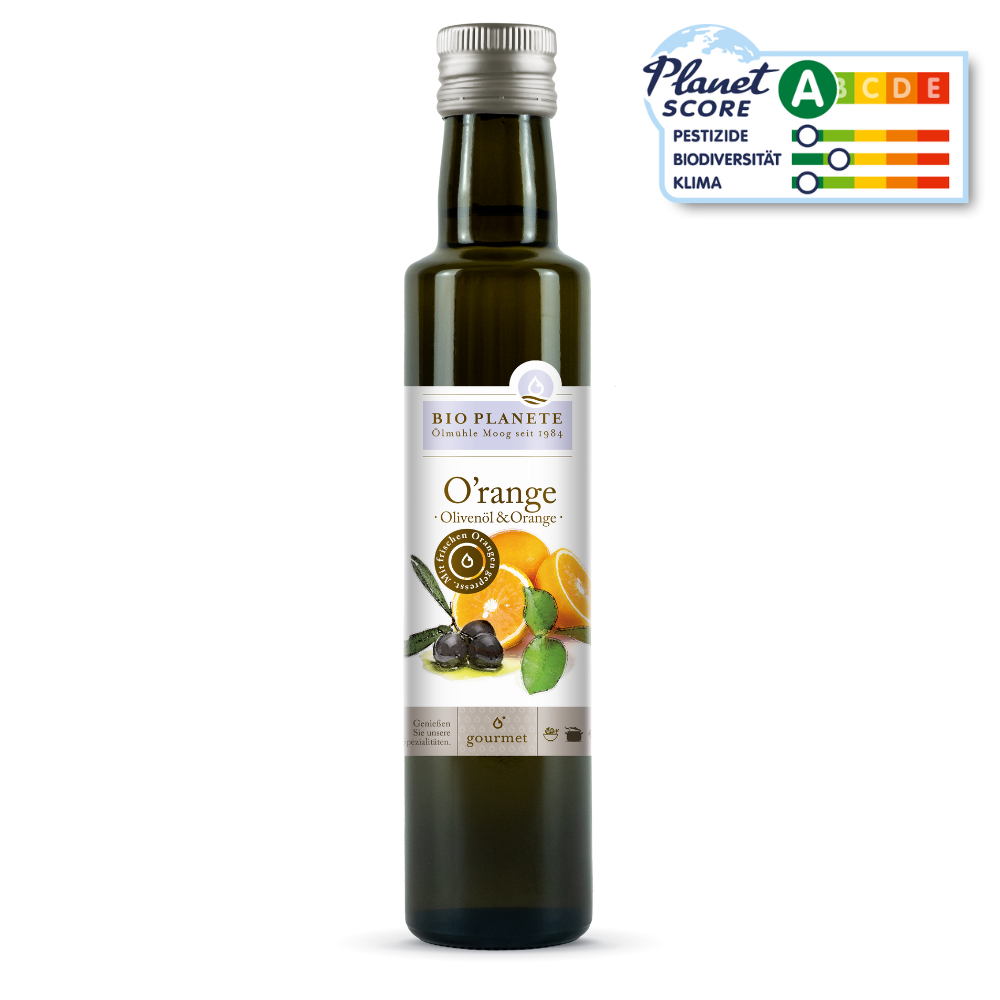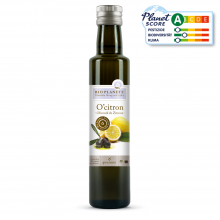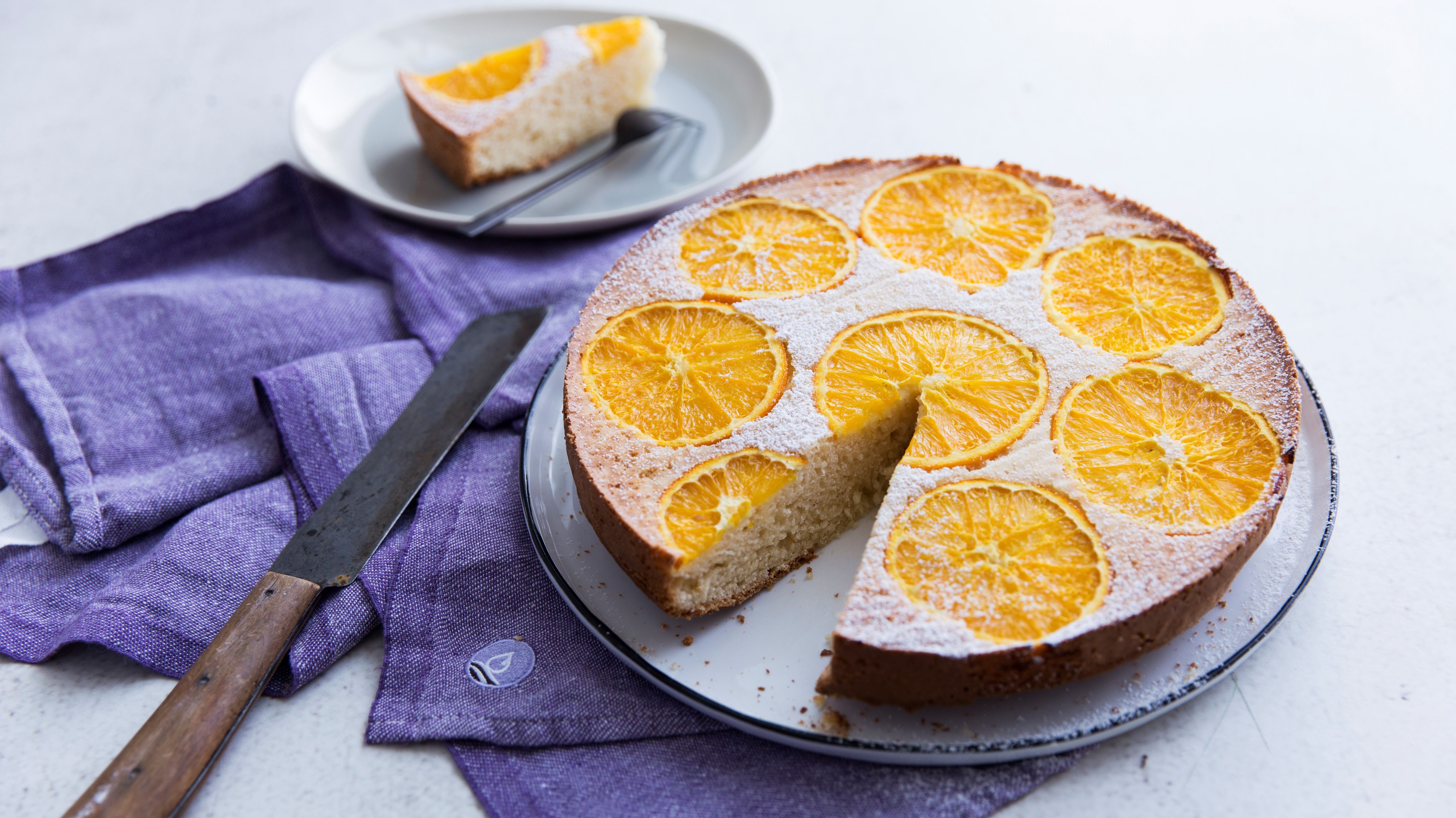O’range – Olive Oil & Orange
· Specialties ·
250 ml
The BIO PLANÈTE specialty O’range indulges the palates of connoisseurs and gourmets with a natural, fruity-fresh note – the result of a sensitive and demanding manufacturing process. Here, the quality of the oil benefits from the long-years experience of our partner mills.
The production of this cold-pressed Olive Oil with orange is exactly how you would imagine it: ripe olives of the wild-growing olive trees are harvested by hand and sorted in the fertile mountains in the Northeast of Tunisia. Within hours, the olives are pressed along with fresh, untreated oranges. This variety of oranges grows in the Tunisian region of Cap Bon and has a particularly fruity-fresh taste.
This oil is one of the first food products in Germany and France which has been rated with the Planet Score. For this eco-labelling, additional indicators are used alongside the life cycle assessment to better capture the environmental impact of food production. Read more about the Planet Score.
Ideas for recipes and use of O`range - Olive Oil & Orange
Our aromatic orange gives fish dishes, shrimps or scampi that certain something. In addition, it goes perfectly with salad dressings and chilled beverages. Or indulge yourself with a delicious orange cake! BIO PLANÈTE O`range can be heated and is suitable for baking.
You are also welcome to try our BIO PLANÈTE O’citron - Olive Oil & Lemon and Olive Oil & Balsamic – Two-Part Salad Dressing.
When harvesting our olives, we can rule out the possibility of birds being killed by high-end automated harvesting equipment. We are in constant close contact with our farmers, who only harvest olives during the day using gentle vibra-tion machines or by hand. Learn more about olive harvesting techniques here.
* Product of organic farming
** For this product, the raw materials may in some cases originate from other countries. This especially holds true in cases of crop shortfall, or when batches of raw goods do not meet our quality requirements. In any event, the raw material are being tested by BIO PLANÈTE and are in 100% compliance with our strict organic quality requirements. The respective origin is always noted on the product label.
Average nutritional analysis for 100 ml
** % of daily reference intake (adults)
-
How long can I keep Olive Oil?
In contrast to wine, Olive Oil does not get better with age. Its essential components, such as mono-unsaturated fatty acids, vitamin E and polyphenols are broken down when stored for a long time. This also creates substances which negatively impact on taste. That's why you should use Olive Oil within a year or at most two years of it being harvested. The use-by dates give you a safe guidance value of good quality and taste.
-
How are olives harvested? Do birds die during olive harvest?
No. Our olives are harvested by hand using gentle rocking techniques. The olives fall on a collecting screen which the farm labourers can remove. We maintain continuous close contact with our farmers and can definitively confirm that, in the absence of highly automated harvesters, no songbirds are killed. Our farmers grow their olives in traditional regions using old, large olive trees on rocky ground which make it impossible to use such harvesters.
-
How should I store Olive Oil?
Olive Oil should always be protected from light irradiation. That's why we always fill our BIO PLANÈTE Olive Oils in high-quality light-protection bottles which shield the oil from light and oxygen. Olive Oil can be stored in the fridge, but this is not a requirement. It also lasts for many months at room temperatures.
-
Can I still use flaky Olive Oil?
Olive Oil can become flaky at temperatures below +7°C. This is normal and does not influence its quality or taste. If you increase ambient temperature again, the oil will liquefy again within only a few hours.
-
Do you use fresh fruit to improve taste?
Yes, Olive oil is pressed together with fresh organic Beldi lemons or Maltaise oranges. This gives it a natural, fresh and fruity flavour – the result of a sensitive and high-quality manufacturing process.
-
Do you use fresh fruit to improve taste?
Yes, Olive Oil is pressed together with fresh organic Beldi lemons or Maltaise oranges. This gives it a natural, fresh and fruity flavour – the result of a sensitive and high-quality manufacturing process.
-
What conditions and standards are behind the organic seal on our oils?
An organic seal is a quality and test seal with which products from organic farming are marked. In 2010, a binding new organic seal was introduced throughout the EU, also known as the EU organic logo, which identifies food from organic farming (a star-shaped leaf on a green background).
This seal replaced the German state organic seal (green hexagon with "BIO" lettering), which had existed since 2001, with the same standards in terms of content. Due to the high degree of popularity of its predecessor, both seals are still often used today.
The use of this certification is strictly regulated by the publisher and is subject to ecological requirements. Compliance with the criteria by producers is ensured by a documentation obligation as well as regular sampling and examination of product samples. Compliance with the regulations is monitored in Europe by the responsible Eco-Control bodies.
Foods labelled with the organic seal must, among other things:
• Not be produced by or with/from genetically modified organisms
• Not to be produced with the use of synthetic pesticides
• Contain no more than 5% conventionally produced components (in exceptional cases, if ingredients are not available in ecological quality, in accordance with Annex VO)
• not contain sweeteners and stabilisers as well as synthetic colourants, preservatives and flavour enhancers
• not result from monotonous crop rotations (two-, three- and four-field farming)
• and much more: more information on the EU Organic Label -
Can I use the oil even after the expiration date?
We can no longer guarantee the oil's perfect quality after its best before date.
In the interest of sustainability, however, we would like to point out the following: vegetable oils do not belong to the group of very sensitive foodstuffs and can usually still be consumed after the best-before date. This is especially true if the bottle is still sealed and it has been stored away from heat sources. Therefore, we recommend using your senses to test the oil before disposing of it. Oil that has been stored for too long can be easily recognized by smell and taste. If it tastes rancid or unusual (off), it should not be consumed. -
How do I remove the labels from the jars and bottles?
Since we use oil-soluble glue for the labels, the best way to remove the label from the coconut jars is with oil. Simply coat the label with oil, let it absorb overnight and peel off easily in the morning. However, if the label is already off and only the glue is on it, this method doesn't work as well. In this context, we have been told of positive experiences with orange oil cleaner, such as from AlmaWin or Sodasan. Another option is a hair dryer - because heat also loosens the label well.
Get more suggestions at Upcycling & Creative.





